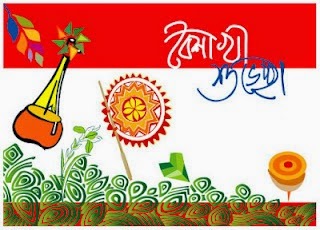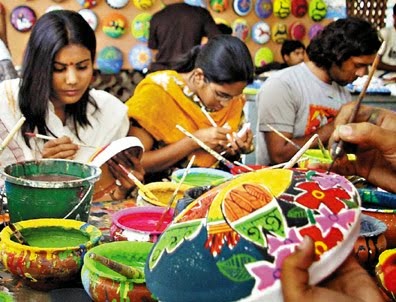According To Wikipedia: Bengali New Year (Bengali: পহেলা বৈশাখ, Pôhela Boishakh; Bengali: নববর্ষ, Nôbôbôrshô), occurring on 14 April or 15 April, is the first day of the Bengali calendar, celebrated in the Bangladesh and in the Indian state of West Bengal, by the Bengali people and also by minor Bengali communities in other Indian states, including Assam, Tripura, Jharkhand and Orrisa. It coincides with the New Year's days of numerous Southern Asian calendars. The traditional greeting for Bengali New Year is শুভ নববর্ষ "Shubhô Nôbôbôrshô". Click Here For Bangla Noboborsho Best SMS collection
Download Free: Pohela Boishakh Best Photo Collection
In Bengali, Pohela stands for ‘first’ and Boishakh is first month of the Bengali calendar.Bengali New Year is referred to in Bengali as "New Year" (Bengali: নববর্ষ Noboborsho) or "First of Boishakh" (Bengali: পহেলা বৈশাখ Pôhela Boishakh). Nobo means new and Borsho means year.
The Bengali calendar is loosely tied with the Hindu Vedic solar calendar, based on the Surya Siddhanta. As with many other variants of the Hindu solar calendar, the Bengali calendar commences in mid-April of the Gregorian year. The first day of the Bengali year therefore coincides with the mid-April new year in Mithila, Assam, Burma, Cambodia, Kerala, Manipur, Nepal, Odisha, Sri Lanka, Tamil Nadu and Thailand.
Origin of Bongabdo or Bangla Year is debated with primarily two hypothesis but historicity of none could be proved till date.
The development of the Bengali calendar is often attributed to king of Gour or Gauda, Shashanka as the starting date falls squarely within his reign.
Nowadays, Pohela Boishakh celebrations also observe a day of cultural unity without distinction between class, race and religious affiliations. Of the major holidays celebrated in Bangladesh and West Bengal, only Pôhela Boishakh comes without any preexisting expectations. Unlike Eid ul-Fitr and Durga Pujo, where dressing up in lavish clothes has become a norm, or Christmas where exchanging gifts has become an essential part of the holiday, Pôhela Boishakh is about celebrating the simpler, rural roots of the Bengal. Eventually, more people can take part in the festivities without the load of having to reveal one's class, religion, or finances.
In Kolkata, Pohela Boishakh (and the entire month of Boishakh) is considered to be an auspicious time for marriages. These days people wear new clothes and go about socialising. Choitro, the last month of the previous year, is the month of hectic activities and frantic purchases. Garment traders organise a Choitro sale and sell the garments with heavy discounts.
Pohela Boishakh is the day for cultural programmes. Prayers are offered for the well-being and prosperity of the family. Young women clad in white saris with red borders and men clad in dhuti and kurta take part in the Probhat Pheri processions early in the morning to welcome the first day of the year. This day being auspicious, new businesses and new ventures are started. The Mahurat is performed, marking the beginning of new ventures.
In Australia, the Bangla new year is celebrated in cities such as Sydney, Melbourne and Canberra through Boishakhi Melas (fairs) where people gather to celebrate the culture Bengalis through dances, fashion shows, stalls of art, music, clothing, food, etc. The largest celebration for the Bangla new year in Australia is the Sydney Boishakhi Mela which was traditionally held at the Burwood Girls High School; from 2006 it has been held at the Sydney Olympic Park. It attracts large crowds and is a very anticipated event on the Australian Bengali community calendar.--Courtesy: wikipedia.org
Click Here For: Happy Bengali New Year 1422 SMS collection, Bangla New Year 1422 Text Messages Collection, Top 10 Bangla New Year SMS, Best Bangla new year sms 1422, Pohela Boishakh 1422 Best SMS, Shuvo Noboborsho 1422 SMS,
Download Free: Pohela Boishakh Best Photo Collection
In Bengali, Pohela stands for ‘first’ and Boishakh is first month of the Bengali calendar.Bengali New Year is referred to in Bengali as "New Year" (Bengali: নববর্ষ Noboborsho) or "First of Boishakh" (Bengali: পহেলা বৈশাখ Pôhela Boishakh). Nobo means new and Borsho means year.
The Bengali calendar is loosely tied with the Hindu Vedic solar calendar, based on the Surya Siddhanta. As with many other variants of the Hindu solar calendar, the Bengali calendar commences in mid-April of the Gregorian year. The first day of the Bengali year therefore coincides with the mid-April new year in Mithila, Assam, Burma, Cambodia, Kerala, Manipur, Nepal, Odisha, Sri Lanka, Tamil Nadu and Thailand.
Origin of Bongabdo or Bangla Year is debated with primarily two hypothesis but historicity of none could be proved till date.
The development of the Bengali calendar is often attributed to king of Gour or Gauda, Shashanka as the starting date falls squarely within his reign.
Nowadays, Pohela Boishakh celebrations also observe a day of cultural unity without distinction between class, race and religious affiliations. Of the major holidays celebrated in Bangladesh and West Bengal, only Pôhela Boishakh comes without any preexisting expectations. Unlike Eid ul-Fitr and Durga Pujo, where dressing up in lavish clothes has become a norm, or Christmas where exchanging gifts has become an essential part of the holiday, Pôhela Boishakh is about celebrating the simpler, rural roots of the Bengal. Eventually, more people can take part in the festivities without the load of having to reveal one's class, religion, or finances.
In Kolkata, Pohela Boishakh (and the entire month of Boishakh) is considered to be an auspicious time for marriages. These days people wear new clothes and go about socialising. Choitro, the last month of the previous year, is the month of hectic activities and frantic purchases. Garment traders organise a Choitro sale and sell the garments with heavy discounts.
Pohela Boishakh is the day for cultural programmes. Prayers are offered for the well-being and prosperity of the family. Young women clad in white saris with red borders and men clad in dhuti and kurta take part in the Probhat Pheri processions early in the morning to welcome the first day of the year. This day being auspicious, new businesses and new ventures are started. The Mahurat is performed, marking the beginning of new ventures.
In Australia, the Bangla new year is celebrated in cities such as Sydney, Melbourne and Canberra through Boishakhi Melas (fairs) where people gather to celebrate the culture Bengalis through dances, fashion shows, stalls of art, music, clothing, food, etc. The largest celebration for the Bangla new year in Australia is the Sydney Boishakhi Mela which was traditionally held at the Burwood Girls High School; from 2006 it has been held at the Sydney Olympic Park. It attracts large crowds and is a very anticipated event on the Australian Bengali community calendar.--Courtesy: wikipedia.org
Click Here For: Happy Bengali New Year 1422 SMS collection, Bangla New Year 1422 Text Messages Collection, Top 10 Bangla New Year SMS, Best Bangla new year sms 1422, Pohela Boishakh 1422 Best SMS, Shuvo Noboborsho 1422 SMS,






